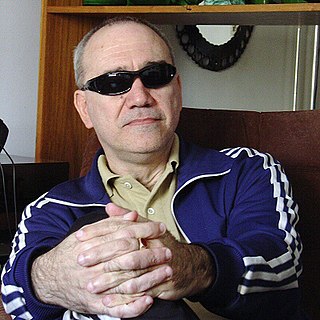Top Qs
Timeline
Chat
Perspective
Glauco Mattoso
From Wikipedia, the free encyclopedia
Remove ads
Pedro José Ferreira da Silva (São Paulo, 29 June 1951), known as Glauco Mattoso, is a poet, writer, novelist, essayist, translator and songwriter from Brazil.[1]
Remove ads
Career
In the 1970s, he participated in the cultural resistance to the military dictatorship through the group of Poesia Marginal. In addition to editing the poetic-pamphlet fanzine Jornal Dobrabil, he collaborated in several alternative press periodicals, such as the gay tabloid Lampião and the humorous newspaper O Pasquim.[2]
In the 1980s, he published works in magazines such as Chiclete com Banana, Tralha, Mil Perigos, SomTrês, Top Rock, Status e Around, essays and literary criticism in Jornal da Tarde, as well as several volumes of poetry and prose. In 1982, he edited the Dedo Mingo magazine as a supplement to the Jornal Dobrabil.[3] With his pornographic poetry, he joined the Porn Art Movement.[4]
In the 1990s, glaucoma cost him his vision. He left behind his graphics work (comic strip and concrete poetry) to dedicate himself to song lyrics and to phonographic production.[5] In 1999, with Jorge Schwartz, he won the Jabuti Prize for his translation of the inaugural work of Jorge Luis Borges, Fervor de Buenos Aires.[6]
In 2015, Glauco Mattoso won the third place in the Oceanos Prize with the work "The First History of the World and Saccola de Feira"[7]
Remove ads
Anterior orthography to 1911
Glauco Mattoso frequently uses the anterior orthography to 1911 in words as "kilômetro", "menarcha", "pharmácia" and others. His orthography is called "etymological orthography".
Books
- Memórias de um Pueteiro (1982)
- Línguas na Papa (1982)
- O Calvário dos Carecas: História do Trote Estudantil (1985)
- Rockabillyrics (1988)
- Limeiriques & Outros Debiques Glauquianos (1989)
- Haicais Paulistanos (1992)
- Galeria Alegria (2002)
- O Glosador Motejoso (2003)
- Animalesca Escolha (2004)
- Pegadas Noturnas: Dissonetos Barrockistas (2004)
- Poética na Política (2004)
- Poesia Digesta: 1974-2004 (2004)
- A Planta da Donzela (2005)
- A Aranha Punk (2007)
- A Letra da Ley (2008)
- O Cancioneiro Carioca e Brasileiro (2008)
- Contos Hediondos (2009)
- Cinco Ciclos e Meio Século (2009)
- Tripé do Tripúdio e Outros Contos Hediondos (2011)
- Raymundo Curupyra, O Caypora: Romance Lyrico (2012)
- Cautos Causos (2012)
- Outros Cautos Causos (2012)
- Sacola de Feira (2014)
- Poesia Vaginal: Cem Sonnettos Sacanas (2015)
- Curso de Refeologia (2018)
References
External links
Wikiwand - on
Seamless Wikipedia browsing. On steroids.
Remove ads

